Books
Books

nmp.07 - drone
no more poetry presents drone, the debut collection from poet felix garner-davis. the book is simple, in that it directs us where to look. high up in the apartment of words the poet offers the audience a window, from which the abundance, beauty, pain and peculiarity of the world can be observed. the poet boldly enacts the role of surveyor, of witness and of voyeur, and asks that we follow suit.
the poems offer new perspectives for which to frame the mechanical and the natural, the quiet and the dizzying. with precision and generosity garner-davis offers an inquisitive consideration of people and their many strange performances within time. the poet asks the audience to join him as the grounded witness; to pause and breath, and in turn celebrate one’s hereness. the poem sings of our aliveness! garner-davis places the reader firmly by his feet, neck tilted against the glass pane of the building or the taxi-cab or the train or the motorcar. thrust into the streets that carry the great disconnect of living; of lives separated and alien, and yet so proximal to our own. this is a book of city poems, guided by the poet, whom we may also call the drone. this is a book that collects many small songs of the everyday and asks us to sing them. drone is a celebration of moments and their endurance
felix is a writer, spoken-word artist & architecture student. he lives in naarm & co-edits the literary journal malevolent soap.
nmp.07:
2021, english — metallic paperback
164 pages — 108 x 178 mm
first edition, edition of 200 (numbered)

nmp.16 - Certainly (certainly)
Rachel Schenberg, Jordi Infeld
This book emerged out of a collaborative writing project that began in 2020 in response to The 3:15 Experiment. The ‘experiment’ involved a group of poets who, every August, would write nightly at 3:15am from wherever they were. It began in 1993 with six poets (Bernadette Mayer, Danika Dinsmore, Jen Hofer, Kathleen Large, Lee Ann Brown, and Myshel Prasad) at the Jack Kerouac School of Disembodied Poetics (Naropa University, Colorado), then continued every August for 22 years, with the group growing to over 25 poets, participating from various time-zones. Four of the initial poets—Mayer, Dinsmore, Hofer, and Brown—compiled The 3:15 Experiment (Owl Press, 2001), a selection of their middle-of-the-night writings between 1993-2000.
This edition builds further on this practice.
"We started thinking about a reading and writing practice that is shared but still divisible, divisible but not subtractable. The structures created by synchronicity, repetition, and temporal constraint felt generative. We found that these structures produced the conditions for another logic to emerge, a night-time logic. This night-time logic gestured to a different kind of self perhaps, a self somewhere between a waking-I and a sleeping-I, a self emerged through habit. After all, logic is just a habit.
This nightly rhythm has now become a yearly ritual: every October we’ve returned to this shared practice. As Jen Hofer says, it’s just “to see what is there. Merely what is there, merely to see.”(2) The poems in this book have been compiled from our first batch of 1:53’s. We edited them ‘together-together’—together trying to attune to each poem’s internal logic, while also trying to locate a collective voice that (we hope) textures throughout.
(Certainly) any writing idea of Bernadette’s is one worth pursuing. This book is dedicated to Bernadette Mayer (1945-2022), and the certainty of possibility her work opens up to us."
on nmp.16:
english, chicago screw, folio cover, 148 x 210 mm
first edition, edition of 115 (numbered).
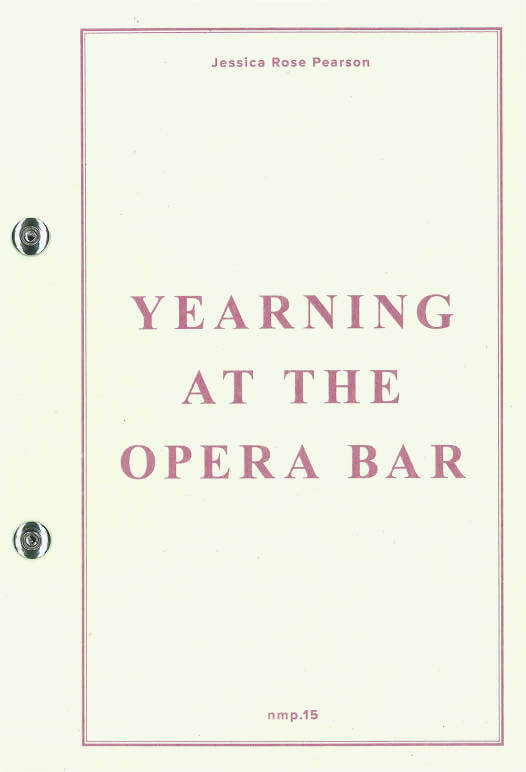
nmp.15 - YEARNING AT THE OPERA BAR
Enter into Jessica Rose Pearson’s debut poetry collection Yearning At The Opera Bar:
The curtain opens on a girl or girl-like thing, early 20’s, laying on the floor of her studio apartment, masturbating, listening to Mass B Minor, BWV 232 “Hohe Messe”: No. 4 Chorus: Et incarnatus est…play it
The next 52 pages descend into the exact document of sex, love and living that you could hope for. The book arrives sharp and stays unrelentingly funny until the very end. What is so special about Pearson’s humour is that it cuts in a way that, while buoyant and playful, reveals something of deep philosophical intrigue. The poetry is determined in its delicate exploration of interpersonal minutiae. Pearson is deeply attuned to both touch and colour and their potential to evoke and seduce the reader. The poetry is concise, considerate and intelligent.
Pearson will define love many times throughout this collection; a pizza hut pamphlet, a green apple, car sex, hourly spoonfuls of yoghurt, stanley tucci. Strangely, what love is doesn’t seem to be what is most important in these poems. What is important is that we get to watch this exploration and in turn witness the many forms desire takes. Indeed we are given a document on love’s mesmerising temporality and strange unpredictable movement. This book is a brilliant survey of attraction’s mysteries.
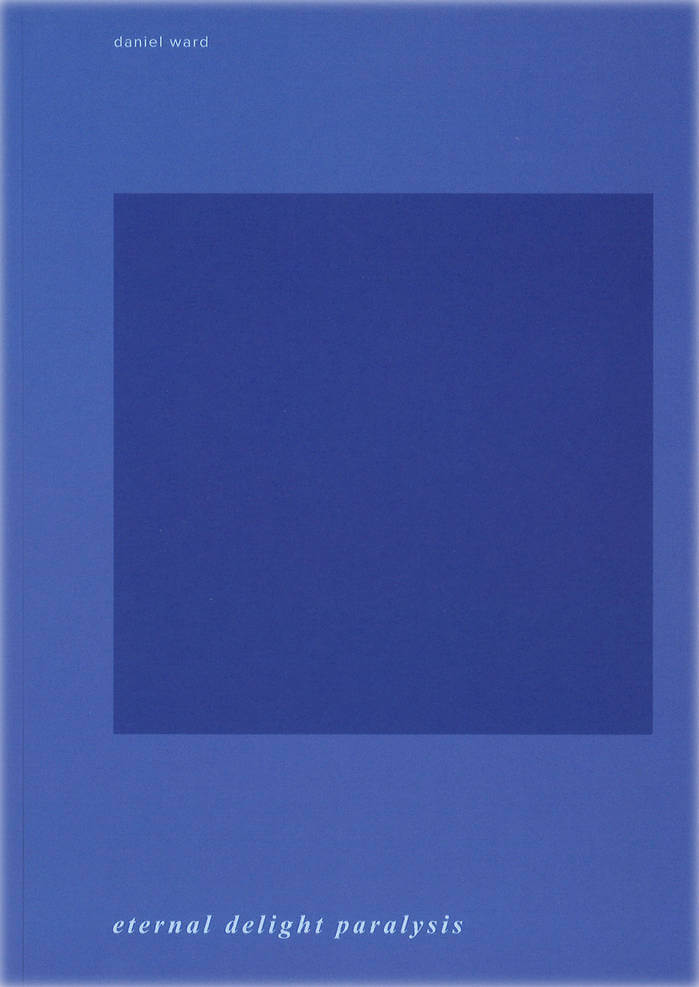
nmp.12 - Eternal Delight Paralysis
"…a book about days and pleasure. the dizzying inaction of life’s excess. it’s an interrogation on the balance of the circle time brings. they are mostly automatic poems. the book feels to be the beginning of a dialogue/catalogue of spirit, in as much as the poems enact a pantheism in their noticing of the body of/as earth. a long ode to witnessing the patterns we lay in avoidance of suffering. it examines a philosophy of patient indifference. and so much else i can’t say, because i’ve spent too long trying to say it. life as the grand poem."—daniel ward reflects on eternal delight paralysis.
nmp.12:
2022, english — paperback
148 pages, 145 x 204 mm
first edition, edition of 200, numbered
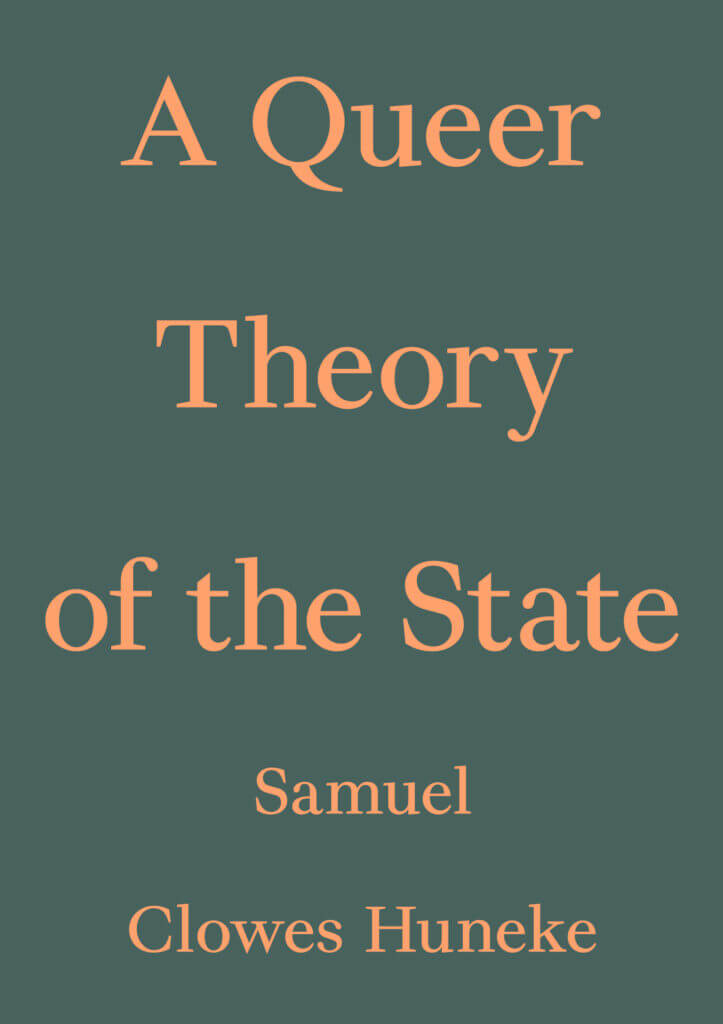
A Queer Theory of the State
How queer theory can wed its critically anti-normative impulses to the empirical need for a state.
Queer theory has often been hesitant to align itself with a politics of the state, approaching it with a negative or pragmatic framework. A Queer Theory of the State offers a more optimistic perspective. Rather than eschew engagement with democratic theorizing, the historian Samuel Clowes Huneke asks how queer theory can wed its critically anti-normative impulses to the empirical need for a state. In answering this question, Huneke shows how the state is an integral component of a politics that seeks to subvert and undo the oppression of queer lives.
Samuel Clowes Huneke is assistant professor of history at George Mason University. His first book, States of Liberation: Gay Men Between Dictatorship and Democracy in Cold War Germany (2022), won the Charles E. Smith Award for best book in European History from the European History Section of the Southern Historical Association. Huneke has written for Boston Review, the Washington Post, The Point, and the Los Angeles Review of Books.

Spectres I: Composer l’écoute / Composing listening
François J. Bonnet, Bartolomé Sanson
[ENG]
This book has been conceived as both a prism and a manual. Following the “traditional” arc of electroacoustic composition (listen—record—compose—deploy—feel), each of the contributions collected together here focuses in on a personal aspect, a fragment of that thrilling territory that is sonic and musical experimentation. Although the term “experimental music” may now have be understood as referring to a genre, or even a particular style, we ought to hold on to the original use of this term, which was based more on an approach than on any particular aesthetic line to be followed. The experimental is first and foremost a spirit, the spirit of the exploration of unknown territories, a spirit of invention which sees musical composition more as a voyage into uncertain territories than as a self-assured approach working safe within the bosom of fully mapped out and recognized lands.
Authors: Félicia Atkinson, François Bayle, François J. Bonnet, Drew Daniel. Brunhild Ferrari, Beatriz Ferreyra, Stephen O’Malley, Jim O’Rourke, Eliane, Radigue, Régis Renouard Larivière, Espen Sommer Eide, Daniel Teruggi,
Chris Watson.
[FR]
Le livre qui suit a été pensé comme un prisme et un manuel. Suivant l’arc « traditionnel » de la composition électroacoustique (écouter — enregistrer — composer —déployer — ressentir), chacune des contributions regroupées ici pointe un aspect personnel, fragment de territoire passionnant qu’est celui de l’expérimentation sonore et musicale. Si le terme de musique expérimentale a pu être assimilé à un genre, voir à un style, il ne faut pour autant pas oublier l’usage initial de ce terme, qui était basé plus sur la démarche que sur la ligne esthétique adoptée.
L’expérimental, en effet, est d’abord un esprit, un esprit d’exploration des territoires inouïs, un esprit d’invention qui voit dans la composition musicale plus un voyage vers des terres incertaines qu’une démarche assurée produisant dans le giron de terres balisées et reconnues.

mnemotope issue 002
This second edition features pieces from 40 contributors that range from soup recipes to poetic essays to drawings to music recommendations to a screenplay and beyond.
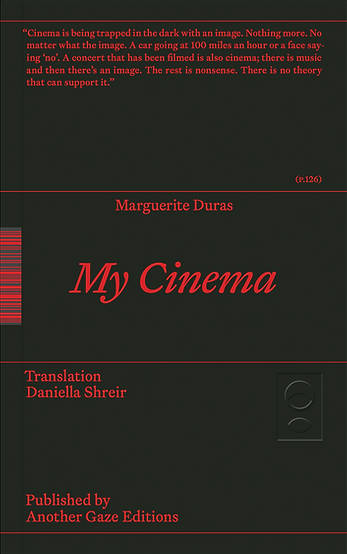
My Cinema
A collection of writings by and interviews with Duras about her filmmaking, first published in French by P.O.L. in 2021 and translated into English by Daniella Shreir.
Working chronologically through her nineteen films, made between 1966 and 1985, this collection of reflections by Marguerite Duras (1914–1996) includes non-standard press releases, notes to her actors, letters to funders, short essays on themes as provocatively capacious as ‘mothers’ and ‘witches’, as well as some of the most significant interviews she gave about her cinematic and writing practices (with filmmakers and critics including Jacques Rivette, Caroline Champetier and Jean Narboni).
In Duras's hands, all of these forms turn into a strange, gnomic literature in which the boundary between word and image becomes increasingly blurred and the paradox of creating a cinema that seeks ‘to destroy the cinema’ finds its most potent expression.
Yet, Duras is never concerned only with her own work, or even with the broader project of making cinema: her preoccupations are global, and the global crucially informs her perceptions of the way in which she works. With the audiovisual as a starting point, her encyclopaedic associative powers bring readers into contact with subjects as diverse as the French Communist Party, hippies, Jews, revolutionary love, madness and freedom, across four decades of an oeuvre that is always in simultaneous dialogue with the contemporary moment and world history.
MARGUERITE DURAS (1914–1996) published over forty novels, numerous essays, novellas and plays and made nineteen films. She was part of the French Resistance, joined then left the Communist Party, and actively protested against the war in Algeria. She collaborated repeatedly with actors including Jeanne Moreau, Delphine Seyrig and Gerard Depardieu. Her films speak of her childhood in Indochina and the French colonies, of desire (burning and frustrated), madness and domesticity. Contemporary filmmakers including Claire Denis, Alice Diop and John Waters have cited Duras’ cinema as inspiration for their own work.

VNOUJE 4
Cécile Bouffard, Roxanne Maillet and 1 more
4ème numéro de l'épopée lesbienne en épisodes par la collective Fusion, ce recueil d'aventures se lit dans n'importe quel ordre.

Whore Foods, Chroniques d'une caissière en chien
LA Warman transforme les rayons d’un supermarché bio en boîte à fantasmes. Des clientes frustrées aux collègues en chaleur, de la boucherie au bar à fruit, de l’orgie à la pause dej’ au booty call dans la chambre froide, chaque recoin du supermarché est propice aux expériences sexuelles de la protagoniste.
Extrait :
« B fait une liste de choses à lécher :
— Du 100% coton, des contenants en plastique fraîchement sortis du lave-vaisselle, tout type de marbre, de la papaye (évidemment,
donner une pichenette aux pépins
avec la langue), des sacs en
plastique remplis de raisin,
n’importe quelle feuille
d’arbre.
— Qu’est-ce que tu lèches
d’autre B ?
— Les pommes, les huîtres,
les prunes, certains
métaux, le pudding, le
lait, les confettis, les vieux
bouts de papier (...) »
.jpg)
Le jukebox des trobairitz
Esmé Planchon, Clara Pacotte and 1 more
D'Alexandrine à Zizanie, 101 définitions mythologiques, topographiques, et poétiques, inventées par Helena de Laurens, Clara Pacotte & Esmé Planchon, inspirées par le Brouillon pour un dictionnaire des amantes de Monique Wittig & Sande Zeig, publié en 1976.

Viscose 05: Retail
Viscose is a journal for fashion criticism. The fifth issue of Viscose explores fashion’s multifaceted retail spaces and cultures. With the evolution of shopping in the 20th and 21st centuries as its focus, the issue looks at the shop as a central nexus where communities and identities are continuously produced and re-imagined through commerce. With a special attention to the role of fashion retail within urban spatial politics, we seek out histories of projects—often developed with or by artists—that have embraced the shop as a medium of both possibility and contestation.
With contributions by:
Dennis Brzek, Anastasia Howe Bukowski, Michael Bullock, Felix Burrichter, Canal Street Research Association, Noah Dillon, Harun Farocki, Anna Franceschini, Ignacio Gatica, Christian Hincapié, Juje Hsiung, Jessica Kwok, Rhonda Lieberman, Matthew Linde, Marge Monko, Cheuk Ng, Luis Ortega, Camila Palomino, Andreas Petrossiants, Leah Pires, International Library For Fashion Research, Vésma Kontere Mcquillan (International Library For Fashion Research), Rose Salane, Alice Sarmiento, Museum Of Modern Shopping, Jeppe Ugelvig, Sean Vegezzi, Post Vsop, Evie Ward, Leah Weirer
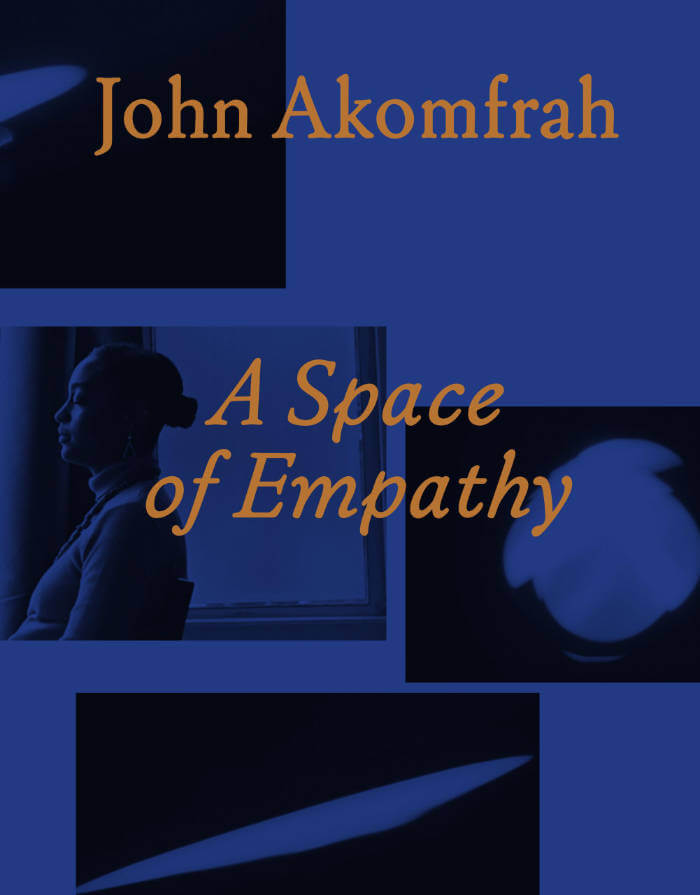
A Space of Empathy
An overview of John Akomfrah's work, with contributions by Julia Grosse and Nelly Y. Pinkrah, an interview with the artist, along with a foreword by Sebastian Baden.
John Akomfrah creates thoughtful video works of haunting audiovisual intensity. He tells of the radical changes and crises of the present and past on characteristic large-format screens. From November 9, 2023 to January 28, 2024, the Schirn Kunsthalle Frankfurt is presenting for the first time a comprehensive overview of the artist's work in Germany, featuring a selection of three major multichannel installations from recent years: The Unfinished Conversation (2012), Vertigo Sea (2015), and Akomfrah's new work, Becoming Wind (2023). A co-founder of the influential London-based Black Audio Film Collective (established in 1982), Akomfrah's work interweaves newly shot film sequences with archival material to create multilayered, at times associative collages, frequently in the form of simultaneous narrative structures.
Akomfrah's immersive installations critically examine colonial pasts, global migration, and the climate crisis. He addresses one-dimensional historical representations by allowing multiple perspectives to emerge in the narrative, disrupting the notion of linearity and the illusion of a one and only truth.
Published on the occasion of the eponymous exhibition at Schirn Kunsthalle Frankfurt in 2023-2024.
John Akomfrah (born 1957) is a British artist, writer, film director, screenwriter, theorist and curator. His works are characterised by their investigations into memory, post-colonialism, cultural identity, temporality and aesthetics and often explores the experiences of migrant diasporas globally. Akomfrah was a founding member of the influential Black Audio Film Collective, which started in London in 1982 alongside the artists David Lawson and Lina Gopaul, who he still collaborates with today.
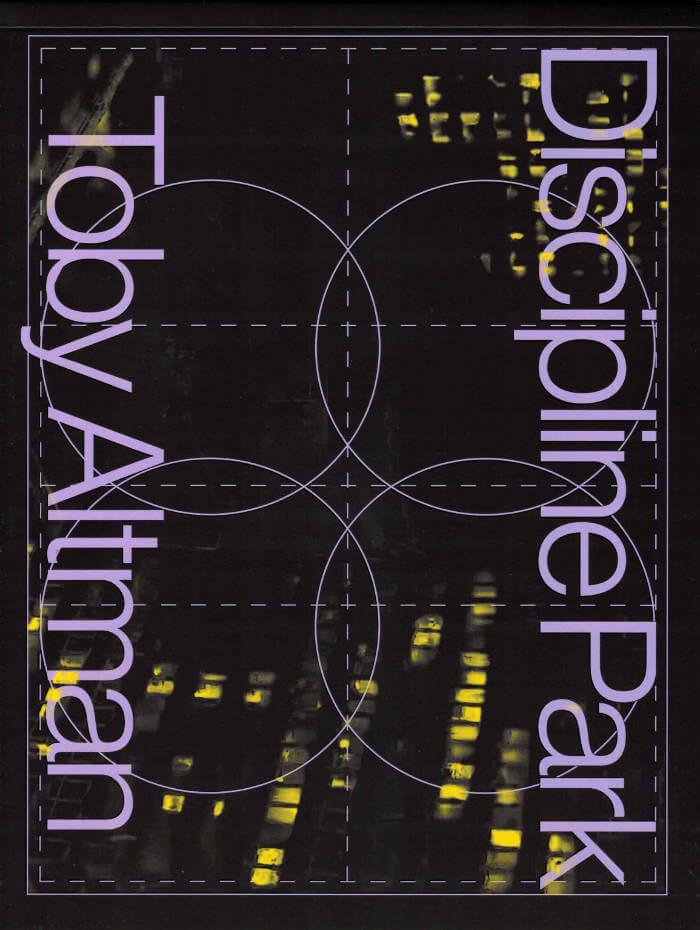
Discipline Park
Toby Altman’s Discipline Park documents the demolition of Prentice Women's Hospital in Chicago, a landmark of architectural brutalism designed by Bertrand Goldberg in the 1970s. Altman was born in the building, and years later, was employed by Northwestern University when they tore it down. His personal proximity to the site leads to a wider critical evaluation of the cruelty of a neoliberalism that asks us to draw sustenance from the very institutions that poison and erase our bodies, habitats, and histories. But, as it indicts the present and its claustrophobic, ruinous politics, Discipline Park also recovers or reinvents utopian vistas through an extended engagement with Goldberg's architectural practices.
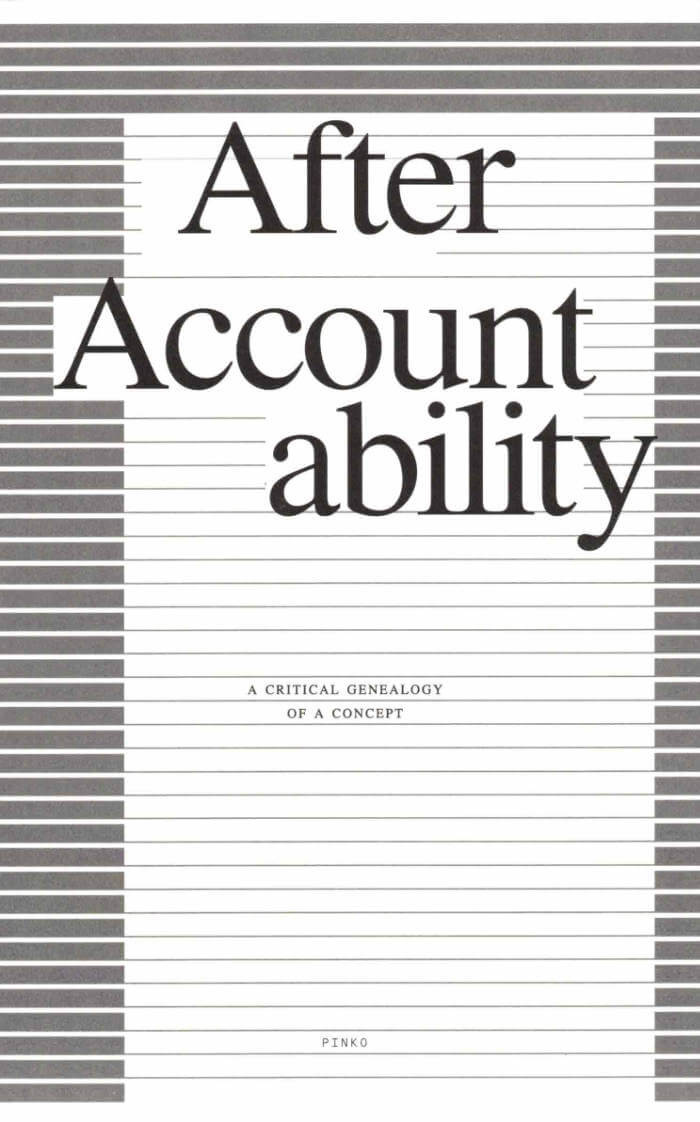
After Accountability
A concept just short of a program, accountability has been taken up as a core principle within leftist organizing and activity over the past quarter century. While it invokes a particular vocabulary and set of procedures, it has also come to describe a more expansive, if often vague, approach to addressing harm within movement work. The term’s sudden, widespread adoption as abolitionist concepts began to circulate broadly in recent years cast light on certain shifts in its meaning, renewing the urgency of understanding its relation to militant history and practice.
After Accountability is an oral history and critical genealogy of this decisive movement concept that gathers interviews with eight transformative justice practitioners, socialist labor organizers, incarcerated abolitionists, and activists on the left conducted by members of the Pinko collective. An investigation into the theoretical foundations and current practice of accountability, this volume explores the term’s potential and limits, discovering in it traces of the past half-century’s struggles over the absence of community and the form revolutionary activity should take.
Pinko is a collective for thinking gay communism together. Pinko publishes a biannual print issue and periodic zines, and hosts irregular essays, translations, and archival material on their website.
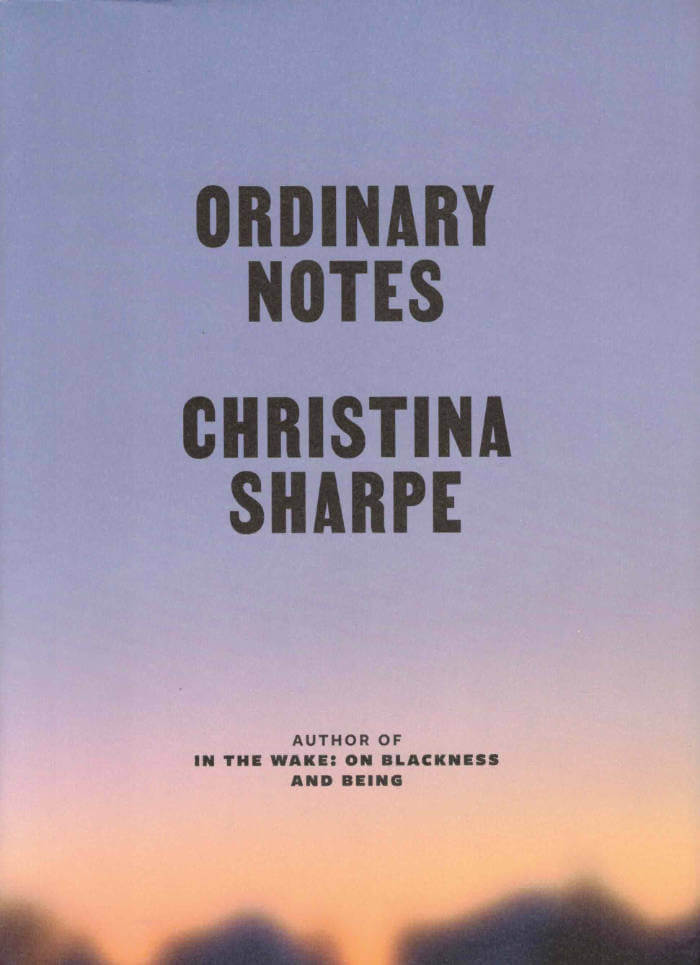
Ordinary Notes
A singular achievement, Ordinary Notes explores profound questions about loss and the shapes of Black life that emerge in the wake. In a series of 248 notes that gather meaning as we read them, Christina Sharpe skillfully weaves artifacts from the past—public ones alongside others that are poignantly personal—with present realities and possible futures, intricately constructing an immersive portrait of everyday Black existence. The themes and tones that echo through these pages—sometimes about language, beauty, memory; sometimes about history, art, photography, and literature—always attend, with exquisite care, to the ordinary-extraordinary dimensions of Black life.
At the heart of Ordinary Notes is the indelible presence of the author’s mother, Ida Wright Sharpe. “I learned to see in my mother’s house,” writes Sharpe. “I learned how not to see in my mother’s house . . . My mother gifted me a love of beauty, a love of words.” Using these gifts and other ways of seeing, Sharpe steadily summons a chorus of voices and experiences to the page. She practices an aesthetic of "beauty as a method,” collects entries from a community of thinkers toward a “Dictionary of Untranslatable Blackness,” and rigorously examines sites of memory and memorial. And in the process, she forges a brilliant new literary form, as multivalent as the ways of Black being it traces.
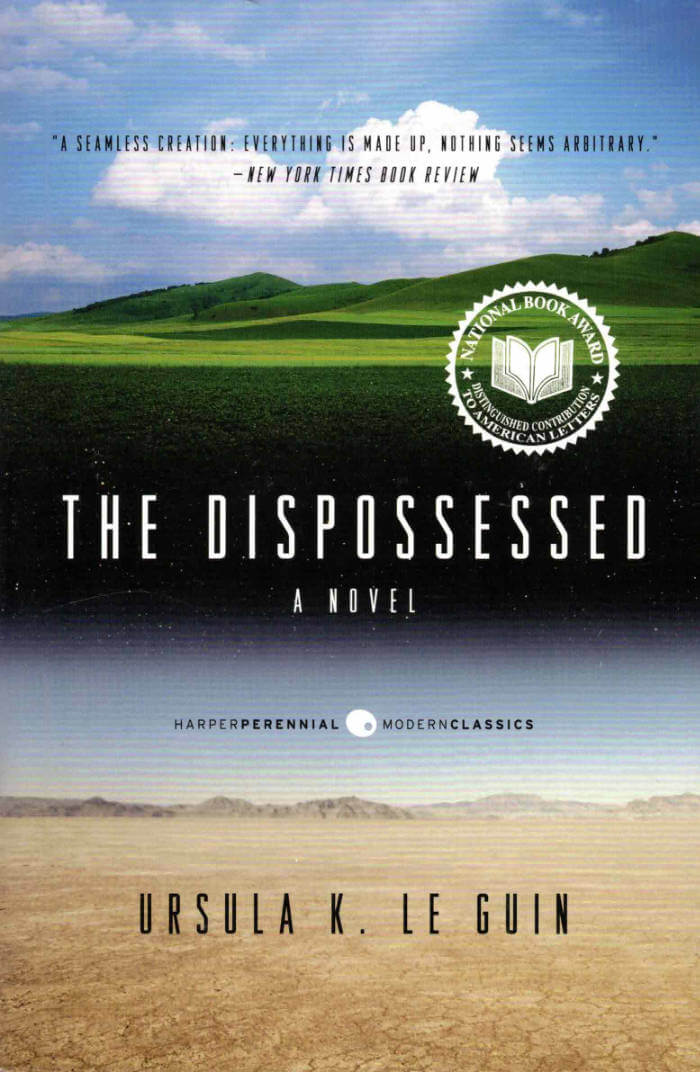
The Dispossessed (Hainish Cycle)
A bleak moon settled by utopian anarchists, Anarres has long been isolated from other worlds, including its mother planet, Urras, a civilization of warring nations, great poverty, and immense wealth. Now Shevek, a brilliant physicist, is determined to reunite the two planets, which have been divided by centuries of distrust. He will seek answers, question the unquestionable, and attempt to tear down the walls of hatred that have kept them apart.
To visit Urras, to learn, to teach, to share, will require great sacrifice and risks, which Shevek willingly accepts. But the ambitious scientist's gift is soon seen as a threat, and in the profound conflict that ensues, he must reexamine his beliefs even as he ignites the fires of change.

Century of Clouds
This edition restores to print a central text of the New Narrative movement, founded in San Francisco by Boone and Robert Gluck in response to the stagnation of contemporary experimental poetry of the late 1970s. Wishing to bring the vigor and energy of the gay rights and feminist movements, Bruce Boone’s writing of the late 1970s is as fresh, funny, witty, and self-reflexive as it was thirty years ago. First published in 1980, Century of Clouds, based on Boone’s experiences at the summer meeting of Marxism and Theory Group in St. Cloud, Minnesota, takes up issues of sexuality, political and theoretical identity, religion, and friendship in the characteristically rich and varied writing of the New Narrative movement.
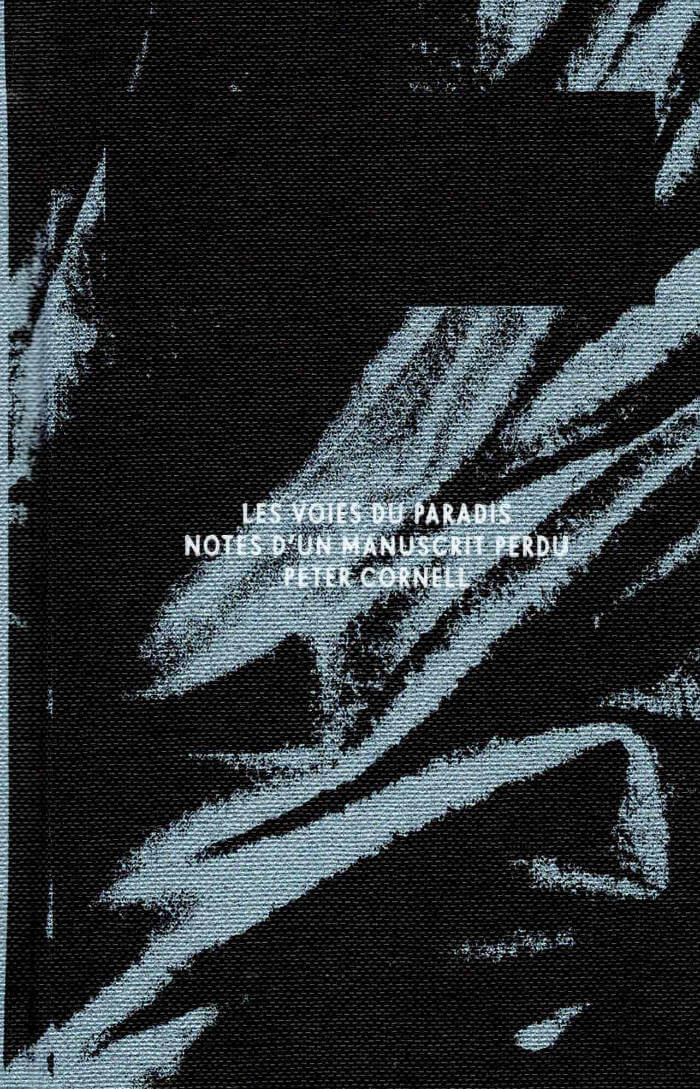
Les Voies du Paradis
Les Voies du Paradis rassemble ce qui subsiste d’une œuvre perdue : les seules notes de bas de page d’un texte manquant, laissées par un chercheur après son décès et éditées par Peter Cornell. Ces notes et leurs illustrations forment un ensemble incomplet, qui se donne ici à lire à travers ses manques. Un fil – d’Ariane ? – se tisse entre les diagrammes, les figures de spirales et de labyrinthes – de Cesare Ripa à Ernst Josephson et Robert Smithson, des Templiers aux spirites et aux surréalistes – qui parcourent le texte et se font écho, comme les éléments d’une énigme ou des figures ésotériques. Le « Paradis » dont il est question ici, c’est le rêve de la connaissance absolue, la saisie de l’ordre caché des choses, à laquelle aspirent autant poètes et artistes que mystiques et scientifiques…
Paru en Suède en 1987, Les Voies du Paradis y a acquis la réputation d’un livre culte. Peter Cornell y propose une perspective inédite sur les liens entre art, littérature, spiritualité et occultisme, dans un texte à mi-chemin de l’essai et de la fiction, de l’érudition et de la mystification. La volonté de savoir y est mise en scène comme une quête prise au piège de l’irrationnel ; les notes s’assemblent par logique associative, programme éclectique qui tente encore de retrouver un centre perdu – comme les algorithmes auxquels est confiée aujourd’hui la tâche fantasmée de mettre en ordre les connaissances humaines.
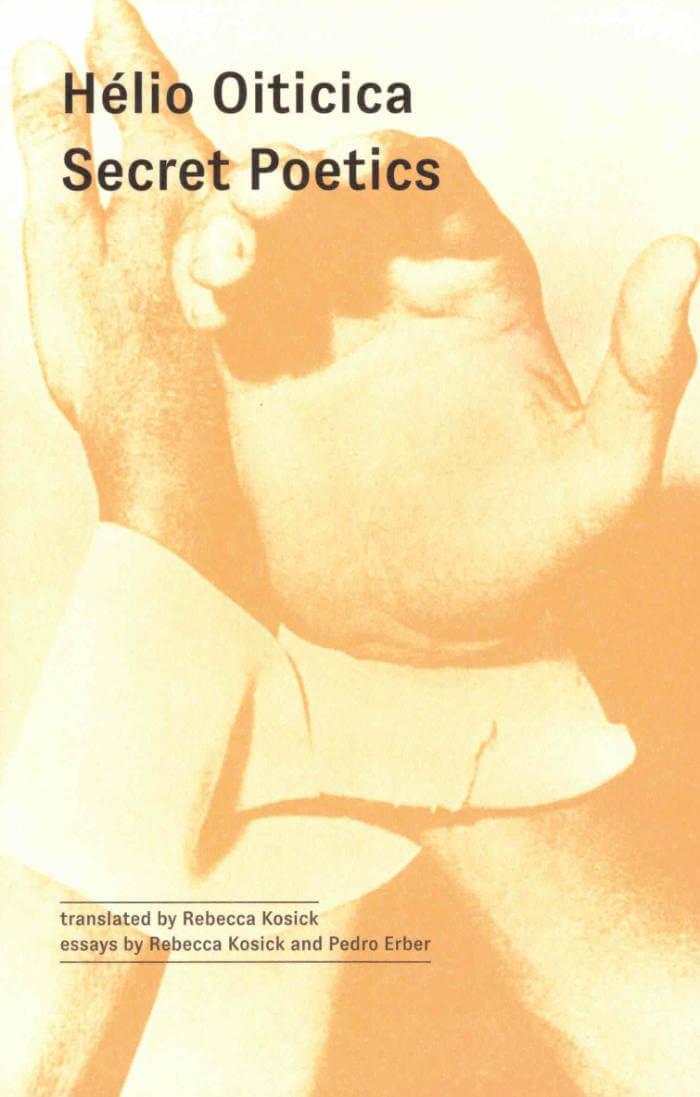
Secret Poetics
Hélio Oiticica (1937-80) is widely considered one of Brazil's most significant artists, and his influence is felt across a range of disciplines including painting, film, installation and participatory art. He is well known as a key founder of the interdisciplinary movement known as Neoconcretismo, launched in Rio de Janeiro in 1959 with the collaboration of artists and writers including Lygia Clark, Lygia Pape and Ferreira Gullar.
Between 1964 and 1966, moving out of his Neoconcretist period, Oiticica wrote a series of lyrical poems entitled Poâetica Secreta (Secret Poetics), and he reflected in a private notebook on their significance for his wider practice as an artist. Despite Oiticica's global fame, his "secret" poems are almost unknown and have never been published as a collection.
This bilingual edition, with accompanying essays by translator Rebecca Kosick and critic Pedro Erber, uncovers the significance of poetry for Oititica's art and shows its importance to his thinking on participation, sensation and memory

Amalgamemnon
History and literature seem to be losing ground to the brave new world of electronic media and technology, and battle lines are being drawn between the humanities and technology, the first world and the third world, women and men. Narrator Mira Enketei erases those boundaries in her punning monologue, blurring the texts of Herodotus with the callers to a talk-radio program, and blending contemporary history with ancient: fairy-tale and literal/invented people (the kidnappers of capitalism, a girl-warrior from Somalia, a pop singer, a political writer), connected by an elaborate mock-genealogy stretching back to the Greek gods, move in and out of each other's stories. The narrator sometimes sees herself as Cassandra, condemned by Apollo to prophesy but never to be believed, enslaved by Agamemnon after the fall of Troy. Brooke-Rose amalgamates ancient literature with modern crises to produce a powerful novel about the future of culture.
Christine Frances Evelyn Brooke-Rose was a British writer and literary critic, known principally for her later, experimental novels.
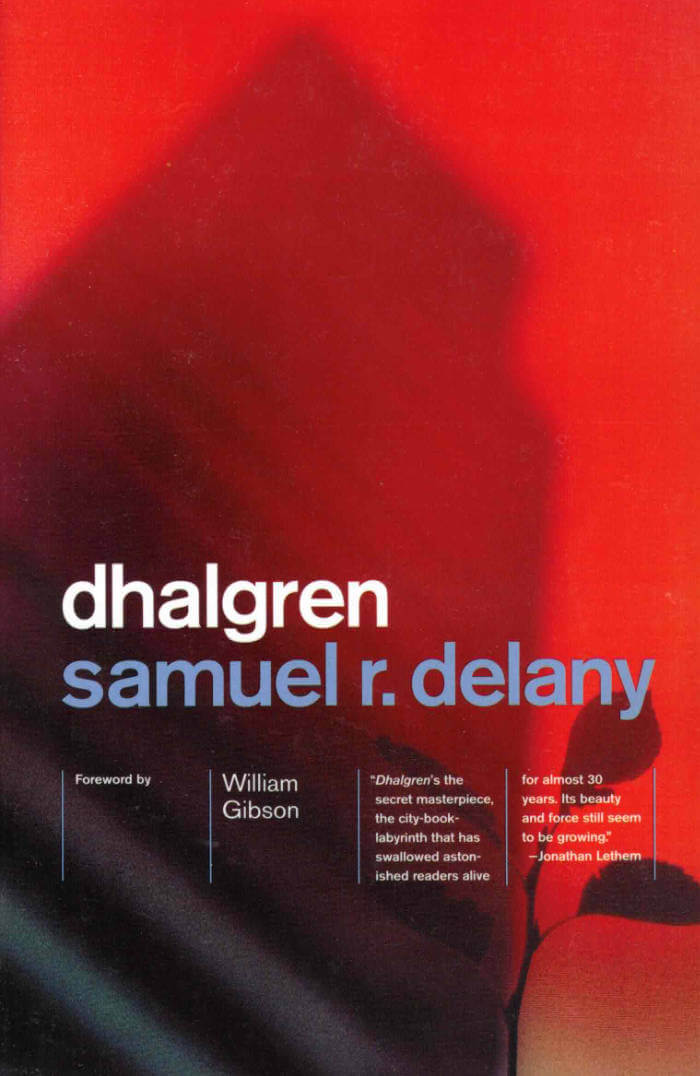
Dhalgren
A mysterious disaster has stricken the midwestern American city of Bellona, and its aftereffects are disturbing: a city block burns down and is intact a week later; clouds cover the sky for weeks, then part to reveal two moons; a week passes for one person when only a day passes for another. The catastrophe is confined to Bellona, and most of the inhabitants have fled. But others are drawn to the devastated city, among them the Kid, a white/American Indian man who can't remember his own name. The Kid is emblematic of those who live in the new Bellona, who are the young, the poor, the mad, the violent, the outcast—the marginalized.

To the Other Side of the Concrete Wall
A collection of translated essays by feminists in Iran that attempts to imagine beyond walls of oppression by navigating the intersections of writing and the everyday becomings of a feminist revolution.
The book includes writings of Elaheh Mohammadi and Niloofar Hamedi, the journalists who were arrested in September 2022 after covering the news of Jina Amini’s murder. Niloofar and Elaheh are still in Tehran’s notorious Even prison today. To the Other Side of the Concrete Wall also includes an essay on the experience of arrest and detention at Evin prison told from the perspective of an anonymous writer who was incarcerated following the Jina Uprising which started about a year ago. These pieces together with two essays by Elaheh and Niloofar’s friend and editor-in-chief of the feminist platform Harass Watch, Ghoncheh Ghavami, are brought together and translated into English for the first time in the Other Side of the Concrete Wall.
To the Other Side of the Concrete Wall was seed-funded by BAK and published by Jina Collective. Jina Collective is a Netherlands-based feminist, leftist, anti-capitalist, anti-sexist, and pro-LQBTQ+ activist group that emerged from the Jina Uprising.

F.R. David - "Erratum"
Following an open call, this is—the very last issue—a collectively-compiled "Erratum", or addendum [if you will] to the twenty-three issues from 2007 until now.
Edited with Paul Abbott, After 8, Alma Sarif, Phil Baber, Daniel Blumberg, Thomas Boutoux, Kristien Van den Brande, Chloe Chignell, Martina Copley, Anthony Elms, Chris Evans, Carolina Festa, Kasper Feyrer, Richard Finlay Fletcher, Ben Green, Mariëtte Groot, Krist Gruijthuijsen, Léa Guillon, Sarah Handley, Gloria Hasnay, Loes Jacobs, Michel Khleifi, Willis Kingery, gerlach en koop, James Goggin, Keira Greene, Léa Guillon, Jacob Lindgren, Kobe Matthijs, Martino Morandi, Zen Nguyen, Alice Notley, Robert M. Ochshorn, Oscar the dog, Willem Oorebeek, David Reinfurt, Scott Rogers, Andrés de Santiago Areizaga, Rosa Sarholz, Clara Schulmann, Andrea di Serego Alighieri, Sabrina Tarasoff, Kristy Trinier, Seymour Wright and Unknown.
F.R.DAVID is a typographical journal, dealing with the organization of reading and writing in contemporary art practices. It was published by de Appel in Amsterdam (2007–2016) and is currently co-published by KW with uh books.